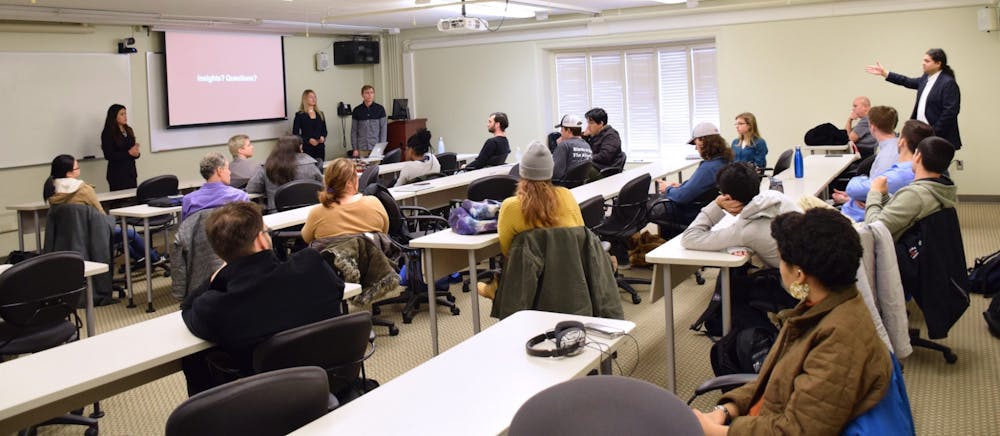With the COVID-19 pandemic disrupting many student programs, especially those involving both regional and international travel, one program, the Diplomacy Lab, continues to grow and thrive.
The Diplomacy Lab project was launched in 2013 by then-Secretary of State John Kerry and allows the U.S. State Department to outsource research and innovation to universities and academic institutions, according to the Diplomacy lab website. The program was piloted at IU-Bloomington in 2016. Since the inception of the program, 30 courses across eight schools have participated in Diplomacy Lab projects.
“It’s an opportunity for faculty and students to engage in real-world, global, diplomatic problems and get some practical training that might lead to student career paths,” said Michael Hamburger, professor of geophysics and IU’s Institutional Co-Coordinator.
The Diplomacy Lab operates through several IU classes, offered through different schools and programs at the undergraduate, graduate and independent study levels. The Diplomacy Lab runs projects in six different classes across four programs this semester, according to the website. Topics this fall range from infrastructure in Asia to the link between artificial intelligence and human rights.
While some classes involved in the Diplomacy Lab are small and niche, even IU’s largest classes are participating. Professor Katie Siek and lecturers Chase McCoy and Logan Paul took a new approach to their Introduction to Informatics and Computing class this semester, which has over 500 students.
Siek and her students are working directly with the State Department to highlight the contribution of American women in Science, Technology, Engineering and Mathematics, according to a News at IU release. Students help the State Department highlight these women and their accomplishments through the development of social media posts and the creation of websites. Students are involved in the entire process, from historical research to website design and data analysis, according to the release.
"Informatics is all about applying technology to solve a problem, and that problem doesn't have to be directly related to programming or technology," Paul said in the release. "It could be a social problem, a design problem, an environmental problem. Informatics is varied, and it is our hope for our students to find what interests them and use our courses and our degree to apply those skills to that interest."
Hamburger was instrumental in bringing the program to IU in 2016 and teaches one of its environmental and energy diplomacy courses. Last semester, Hamburger and his students worked directly with the State Department and the U.S. Embassy in Mexico City to develop risk management reports on potential natural disasters and how they can affect Americans and American interests.
Hamburger said the class and project can be very beneficial to students, who can gain real-world experience working on real-world problems, he said. Students are also given the opportunity to solve issues and problems the way professionals would. This program is where academics meet issues, he said.
Diplomacy Lab projects help and encourage students to think differently and work under different circumstances, Hamburger said. Students learn to work directly with clients who want and expect specific areas of research that can benefit the State Department, American citizens and American interests across the globe.
“What’s exciting about it for students is that they’re dealing with timely and important regional to global issues in diplomacy, development and international security,” Hamburger said. “What is challenging about it is that there is often no textbook or game plan and it’s often devised on the fly.”
Students and staff collaborate directly with officials who are the clients of their project. Last spring, Hamburger and his students worked with U.S. Mexican Embassy officials on their natural disasters project, including giving a final presentation with their report’s findings.
IU senior Sarah Nance was a student in Hamburger’s class last spring and worked on one of the four teams that focused on natural disasters. Teams of graduate and undergraduate students studied volcanoes, landslides and floods, earthquakes and tsunamis and meteorological hazards, including hurricanes and tornadoes.
Nance, a policy analysis major, was the only student in her group who was not a geology or geological science major. Because she had less knowledge of the major research, she worked mostly with interpreting data and creating the language to present to the State Department, she said. Nance was one of the students to give the final presentation to the staff of the U.S. Embassy in Mexico City.
Working closely and directly with the clients was something Nance said she enjoyed about the project. Not only were they available to talk about the research, but they were also willing to talk about things other than the project. Nance said seeing what these officials do every day made her see a possible new career path.
“I never really thought working for the government was for me,” Nance said. “I always saw myself working for a think tank, but this really changed how I think about government work.”




